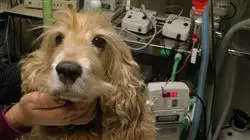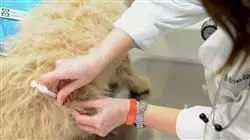University certificate
The world's largest faculty of veterinary medicine”
Introduction to the Program
Specialize in Systemic Veterinary Pharmacology through a revolutionary education, known for its teaching and content quality, and its intensive and flexible approach at the same time"

Given the large number of functions and organs that are controlled by the autonomic nervous system and the relatively small number of different receptors that mediate cholinergic and adrenergic transmission, it is difficult to ensure that drugs that interfere with these neurotransmitter systems achieve the necessary selectivity (absence of side effects) to be able to make broad therapeutic use of them.
However, many of them are valuable tools in pharmacological research that have found some clinical utility by acting in three ways: by modifying the availability of the transmitter in the extracellular space, by acting on the presynaptic element (preganglionic or postganglionic nerve fibers) and by acting at the postsynaptic level (soma of the postganglionic neuron or effector cell).
It establishes the drugs used for the treatment of a wide variety of neurological and psychiatric diseases, analgesics, among other symptoms.
Due to their complexity, the mechanisms by which various drugs act on the Central Nervous System are not always well understood. These drugs with effects on the Central Nervous System act on specific receptors that regulate synaptic transmission.
This Postgraduate diploma examines the main pharmacological properties (mechanism of action, pharmacokinetics, and therapeutic and toxic effects) of groups of drugs that act on the cardiovascular, respiratory, renal and blood systems.
Classifies the different drugs that act at the vascular level, such as coagulation modifiers and cardiac drugs.
It examines the different drugs that act as respiratory stimulants, bronchodilators, expectorants and antitussives.
It deals with the pharmacology of the digestive system, both at the level of secretion and motility, laxative and antidiarrheal drugs, as well as pharmacology of vomiting.
It offers specialized knowledge on the different drugs that act on the motility of the stomach and its secretions, as well as drugs that act on gastric pH, on the intestinal tract and on rumen-reticulum motility.
Get up to date on the use of systemic drugs in the veterinary field for the prevention and treatment of diseases affecting animal health”
This Postgraduate diploma in Systemic Veterinary Pharmacology contains the most complete and up-to-date educational program on the market. The most important features include:
- Innovative and up-to-date diagnostic techniques in infectious diseases and their application in daily clinical practice, including the use of cytology as a diagnostic tool in these diseases
- The most frequent and not so frequent pathologies of infectious origin in dogs from a practical and completely up-to-date point of view
- Infectious Pathologies oriented to the Feline Species, dealing extensively with all those of this species
- Vision "One Health", in which Zoonoses and their implications for public health will be reviewed
- Most frequent Infectious Pathologies of Dogs and Cats in the Tropics, with focus on Latin America. At present, there are no more exotic diseases, and they should be included by the clinician in the differential diagnosis when the epidemiology allows to suspect them
- Prevention and management of all infectious diseases, including clinical, home and community settings
A revolutionary program for its ability to reconcile the highest quality of learning with the most complete online Education"
Its teaching staff includes professionals belonging to the field of Veterinary Medicine, who bring to this training the experience of their work, as well as renowned specialists from reference societies and prestigious universities.
The multimedia content, developed with the latest educational technology, will provide the professional with situated and contextual learning, i.e., a simulated environment that will provide immersive training programmed to train in real situations.
This program is designed around Problem-Based Learning, whereby the specialist must try to solve the different professional practice situations that arise throughout the program. For this purpose, the professional will be assisted by an innovative interactive video system created by renowned and experienced psychology experts.
Advance your skills and keep up to date with all the latest developments in pharmacological approaches in this particular area"

Learn efficiently, with a real qualification objective, with this Postgraduate diploma, unique for its quality and price, in the online teaching market"
Why study at TECH?
TECH is the world’s largest online university. With an impressive catalog of more than 14,000 university programs available in 11 languages, it is positioned as a leader in employability, with a 99% job placement rate. In addition, it relies on an enormous faculty of more than 6,000 professors of the highest international renown.

Study at the world's largest online university and guarantee your professional success. The future starts at TECH”
The world’s best online university according to FORBES
The prestigious Forbes magazine, specialized in business and finance, has highlighted TECH as “the world's best online university” This is what they have recently stated in an article in their digital edition in which they echo the success story of this institution, “thanks to the academic offer it provides, the selection of its teaching staff, and an innovative learning method aimed at educating the professionals of the future”
A revolutionary study method, a cutting-edge faculty and a practical focus: the key to TECH's success.
The most complete study plans on the university scene
TECH offers the most complete study plans on the university scene, with syllabuses that cover fundamental concepts and, at the same time, the main scientific advances in their specific scientific areas. In addition, these programs are continuously being updated to guarantee students the academic vanguard and the most in-demand professional skills. In this way, the university's qualifications provide its graduates with a significant advantage to propel their careers to success.
TECH offers the most comprehensive and intensive study plans on the current university scene.
A world-class teaching staff
TECH's teaching staff is made up of more than 6,000 professors with the highest international recognition. Professors, researchers and top executives of multinational companies, including Isaiah Covington, performance coach of the Boston Celtics; Magda Romanska, principal investigator at Harvard MetaLAB; Ignacio Wistumba, chairman of the department of translational molecular pathology at MD Anderson Cancer Center; and D.W. Pine, creative director of TIME magazine, among others.
Internationally renowned experts, specialized in different branches of Health, Technology, Communication and Business, form part of the TECH faculty.
A unique learning method
TECH is the first university to use Relearning in all its programs. It is the best online learning methodology, accredited with international teaching quality certifications, provided by prestigious educational agencies. In addition, this disruptive educational model is complemented with the “Case Method”, thereby setting up a unique online teaching strategy. Innovative teaching resources are also implemented, including detailed videos, infographics and interactive summaries.
TECH combines Relearning and the Case Method in all its university programs to guarantee excellent theoretical and practical learning, studying whenever and wherever you want.
The world's largest online university
TECH is the world’s largest online university. We are the largest educational institution, with the best and widest online educational catalog, one hundred percent online and covering the vast majority of areas of knowledge. We offer a large selection of our own degrees and accredited online undergraduate and postgraduate degrees. In total, more than 14,000 university degrees, in eleven different languages, make us the largest educational largest in the world.
TECH has the world's most extensive catalog of academic and official programs, available in more than 11 languages.
Google Premier Partner
The American technology giant has awarded TECH the Google Google Premier Partner badge. This award, which is only available to 3% of the world's companies, highlights the efficient, flexible and tailored experience that this university provides to students. The recognition as a Google Premier Partner not only accredits the maximum rigor, performance and investment in TECH's digital infrastructures, but also places this university as one of the world's leading technology companies.
Google has positioned TECH in the top 3% of the world's most important technology companies by awarding it its Google Premier Partner badge.
The official online university of the NBA
TECH is the official online university of the NBA. Thanks to our agreement with the biggest league in basketball, we offer our students exclusive university programs, as well as a wide variety of educational resources focused on the business of the league and other areas of the sports industry. Each program is made up of a uniquely designed syllabus and features exceptional guest hosts: professionals with a distinguished sports background who will offer their expertise on the most relevant topics.
TECH has been selected by the NBA, the world's top basketball league, as its official online university.
The top-rated university by its students
Students have positioned TECH as the world's top-rated university on the main review websites, with a highest rating of 4.9 out of 5, obtained from more than 1,000 reviews. These results consolidate TECH as the benchmark university institution at an international level, reflecting the excellence and positive impact of its educational model.” reflecting the excellence and positive impact of its educational model.”
TECH is the world’s top-rated university by its students.
Leaders in employability
TECH has managed to become the leading university in employability. 99% of its students obtain jobs in the academic field they have studied, within one year of completing any of the university's programs. A similar number achieve immediate career enhancement. All this thanks to a study methodology that bases its effectiveness on the acquisition of practical skills, which are absolutely necessary for professional development.
99% of TECH graduates find a job within a year of completing their studies.
Postgraduate Diploma in Systemic Veterinary Pharmacology
.
Systemic veterinary pharmacology is an essential discipline in the field of veterinary medicine. This fascinating field focuses on the study of drugs and their effect on the biological systems of animals. From dogs and cats, to exotic and farm animals, systemic veterinary pharmacology is applied to a wide range of species to improve their health and well-being. Would you like to become a specialist in this field? TECH Global University has the ideal program for you. The Postgraduate Diploma in Systemic Veterinary Pharmacology is a high-level online postgraduate degree that will help you fulfill that purpose. Here, you will immerse yourself in the study of drugs used in the treatment of diseases and medical conditions in animals. In addition, you'll learn the fundamental principles of pharmacology, including the absorption, distribution, metabolism and elimination of drugs in the animal body.
Master systemic veterinary pharmacology
.
Why choose us? Because we not only have significant academic experience endorsed by major educational organizations and international media such as Forbes, but we offer a 100% online professionalization with infallible results. Our team of professors will guide you through the different classes and provide you with a solid knowledge base in veterinary pharmacology. You will explore the various groups of drugs used in animals such as analgesics, antibiotics, anti-inflammatory and anti-parasitic drugs, among others. In addition, you will understand how these drugs interact with the animal organism and how they are selected and administered safely and effectively. Finally, you will learn about the ethical and legal considerations in the use of drugs in animals and how to maintain safety for both the animals and the people involved in their handling.







